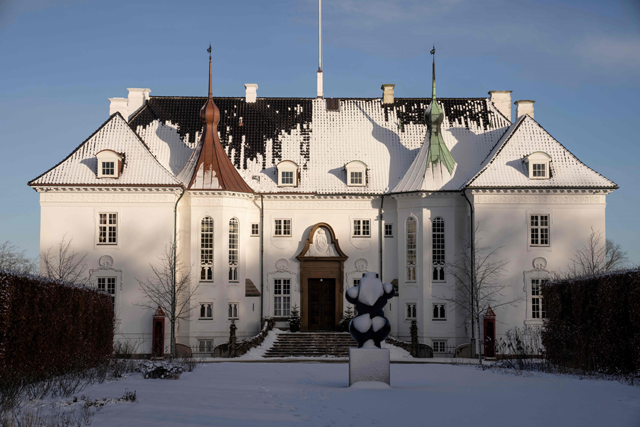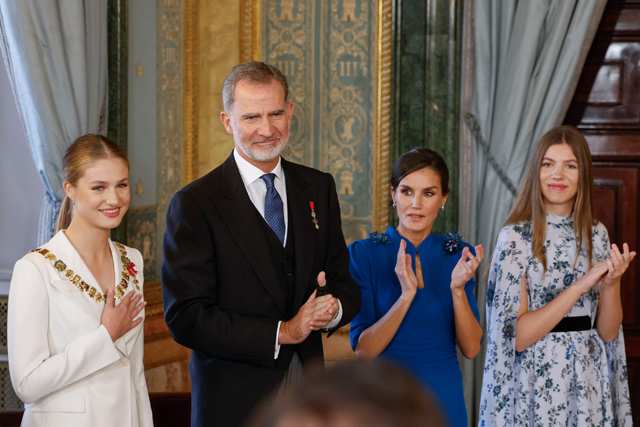You are here
More queens in store for European royalty as Gen Z rises
By AFP - Jan 17,2024 - Last updated at Jan 17,2024

The Marselisborg Castle in Aarhus, where the royal family resides over the Christmas holidays, is photographed on Wednesday (AFP photo)
PARIS — The abdication of Denmark’s Queen Margrethe leaves Europe without a female monarch, but not for long — a young generation of princesses born in the 21st century will be ascending to thrones across the continent in the coming years.
Belgium’s Princess Elisabeth, born in 2001; Catharina-Amalia of The Netherlands (2003); Ingrid Alexandra of Norway (2004); Leonor of Spain (2005); and Estelle of Sweden (2012) — half of the hereditary monarchies on the Continent are likely to be led by a queen before too long.
Many will be the first to take the throne after the introduction of female succession laws, a privilege previously reserved for male heirs.
Previous queens, such as Elizabeth II of Britain, who died in 2022, had no brothers to inherit the throne.
“Sweden was the first country in the world to adopt a gender-neutral order of succession, in 1980, when Princess Victoria bumped her younger brother down and she became crown princess” retroactively, Swedish royals expert Roger Lundgren told AFP.
Modern monarchs
Several experts said gender was unlikely to have much of an impact as the future queens embrace their new roles.
“Much of what kings and queens do today, and what they will do in 25 years, is what kings did 200 years ago too — state visits, receiving ambassadors, ceremonial things,” Lundgren said.
Lundgren also noted that unlike earlier generations of queens, many in the upcoming generation has done some form of military service in their country.
In December, for example, Spain’s Hola! magazine showed Princess Leonor in combat camouflage taking part in ski drills with her unit on slopes in the Pyrenees.
Other princesses have studied in elite schools at home or abroad — both Leonor and Princess Elisabeth of Belgium studied at Atlantic College in Wales — exposing them more to global affairs and concerns such as feminist causes or the risks from climate change.
“A clearer, firmer footing in the everyday life of the people, in combination with the pomp, castles, jewels and the fairy tale, is the winning concept to keep the monarchy,” said Ebba Kleberg von Sydow, a Swedish influencer and royals expert.
She said the future queens were likely to prove more media-savvy as well, if only to show that monarchies remain grounded and relevant in modern society.
Lundgren noted that while Queen Margrethe “doesn’t even own a smartphone, and is proud of it”, Crown Princess Victoria of Sweden, Denmark’s Crown Prince Frederik and Norway’s Crown Prince Haakon have their own WhatsApp group.
“You need to be on more platforms, have your message reach people in a completely different way, now that traditional media channels that previous generations of royals used no longer reach everyone,” von Sydow said.
New challenges
In many ways, Europe’s future queens will be wrestling with new iterations of the question that has often confronted their ancestors.
“Each new generation of monarchs has had to face one main challenge, and not the least: the questioning of what is the use of a monarchy,” said Lisa Castro, a royals historian at the University of Toulouse-Jean Jaures in southern France.
Related Articles
COPENHAGEN — Denmark’s popular Queen Margrethe II, Europe’s longest-serving monarch and last reigning queen after the death of Britain’s Eli
COPENHAGEN — The Duchess of Cambridge kicked off a rare solo visit to Denmark on Tuesday, where she will spend two days with officials excha
MADRID — Princess Leonor, heir to the Spanish crown, swore loyalty to the constitution on Tuesday, her 18th birthday, a legal milestone that
















